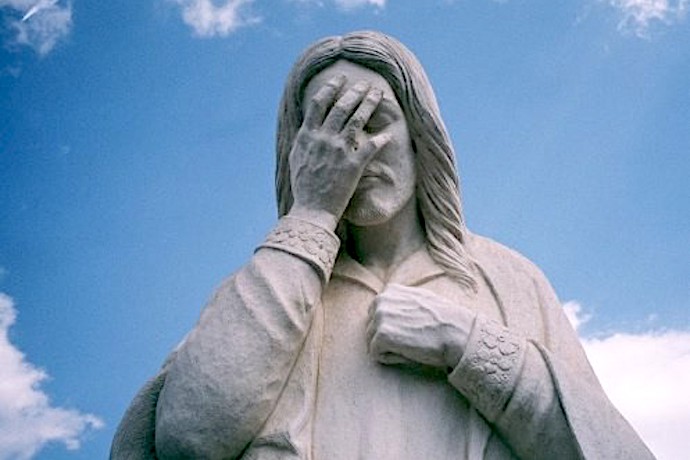We typically don’t go in for images of train wrecks or listicles at Religion Dispatches, but a recent Twitter thread by RedState publisher and notorious troll Erick Erickson prompts us to shake things up a little.
First, the train wreck (I’ll explain why it’s just an image in a bit):

And now the listicle:
- This doesn’t actually explain cancel culture. Also, cancel culture is an idea made up in the past couple of years by conservatives who don’t like how society has decided to hold people accountable for past words and deeds. If it were really such a threat to Christian liberty, you might expect that someone would have noticed it at some point in the past 2,000 years. They have not.
- Eschatology is the study of the ultimate destiny of humanity. What Erickson is discussing here is soteriology, the nature and means of salvation.*
- There are as many understandings of salvation as there are Christians, not nearly all of which require a “direct relationship with Christ,” and even fewer of which involve a direct relationship in the evangelical Protestant sense that Erickson is almost certainly referencing. To name just a few of the major ones, there’s atonement, which may or may not be sacrificial, mediation, adoption, redemption, and reconciliation, each of which have their own variants, and not all of which require a personal relationship with Christ.
- Salvation is never “regardless of others.” It’s true, for example, that Paul instructs the Philippians to “work out your own salvation in fear and trembling,” but that’s a way of saying “mind your own business” and even that advice comes in a community setting. Christian scripture and theology is abundantly clear that salvation is for the world, not individual believers without respect to the people around them. Otherwise, we would have justification for antinomianism, and that’s surely not what Erickson wants.
- Again, it’s “soteriology” we’re after, not “eschatology.” There is no such thing as a secular soteriology, because of course secular systems of thought have no need for external agents of salvation. The only secular eschatology that I’m aware of is the Marxian triumph of the proletariat. This is not that.
- Defining “woke” in opposition to Christianity is problematic, to say the least. There are plenty of woke Christians. (Source: I’m from the United Church of Christ.)**
- The idea that “woke culture” is about silencing its opponents is tendentious to begin with. Claiming that it silences good wholesome Christian values in specific turns it into quite the stretch. Even setting aside a general lack of evidence, salvation is not the same as being held accountable. It’s perfectly consistent with Christian thought to accept that felons have been saved by Christ—but they still have to serve their sentence. Even in evangelical Christianity, the understanding is that initial justification must be followed by sanctification before salvation can be completed. In plain English: you have to repent of your sins and change your ways before St. Peter lets you past the Pearly Gates. That’s as true of saying horrible racist crap or doing horrible sexist things as it is of any other sin.
So that’s three arguments and ten errors by my count, plus one majorly unsupported assertion. Well, besides that, he got several words right, including “this” and “Christ,” though I’m not entirely certain about that last one. I must say, if this were a paper handed in for my section of Theology 101, it wouldn’t do very well, and Erickson is supposedly working on a Masters in the subject.
As Jamelle Bouie quips, “It’s a nice gig [Erickson] has going, just making up stuff and attributing to an ill-defined group that he knows his audience hates.” Exactly. That’s why I’m not linking to the original tweet, or to the thread that follows. It’s just a variation on the troll’s game: say something outrageous, get called on it, then collect the clicks and views to puff up your importance even as you claim to be “silenced” by your detractors.
On the one hand, ‘owning the libs’ does seem to be Erickson’s definition of Christianity, so two points to him for living his values, I guess? But on the other hand: it’s a grift. Erickson couldn’t theologize his way out of an open-air narthex, and no one is required to take him seriously as an interpreter of any kind of thought, Christian or otherwise.
(Tips o’ the pin to *James Gilmore and **Jack Jenkins.)


